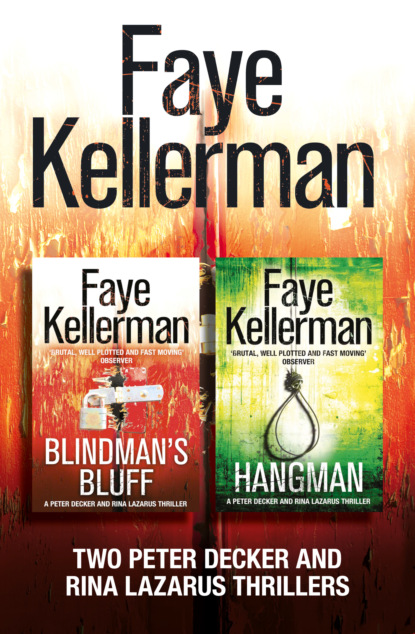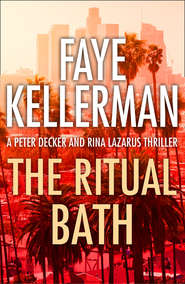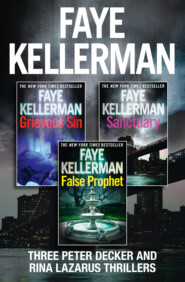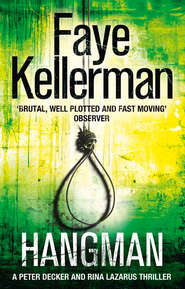По всем вопросам обращайтесь на: info@litportal.ru
(©) 2003-2025.
✖
Peter Decker 2-Book Thriller Collection: Blindman’s Bluff, Hangman
Автор
Год написания книги
2019
Настройки чтения
Размер шрифта
Высота строк
Поля
“This morning, you’ll probably have more of a lamb than a lion.”
“Whatever I get is fine.” He put down his mug. “She’s a good girl. She’s my baby and I love her dearly. If I’m a safe target for some of her frustration, so be it. If God’ll just keep her safe, I’ll take all those slings and arrows.”
Oliver knocked on the doorjamb and without waiting for an invitation, he walked into Decker’s office. He had a mug of coffee in one hand and was holding a sheet of paper in the other. The man looked positively drained.
“Get any sleep last night, Oliver?”
“A couple of hours, but I’ll be all right.” He handed Decker a neatly typed up paper that resembled a family tree. “I’ve outlined Kaffey Security 101. If you look at the top of the sheet, I have Neptune Brady in the starring position because he’s the head honcho. Then I branch off.”
“Well done,” Decker said.
“Not too bad for a zombie.” Oliver smiled. “I divided it into two categories—guards at the ranch and personal bodyguards. Personal bodyguards—which I’ve abbreviated as PBG—are or were used mainly when Guy and Gilliam went out in public—restaurants, charity functions, business functions, parties. At least one PBG was with them at all times.”
“What about if they went out individually?”
“Don’t know about Gilliam, but there was definitely one on Guy. When no one was home, the security guards, or SG, watched the properties. So far I got fourteen names, but you can see there’s overlap. Rondo Martin, Joe Pine, Francisco Cortez, Terry Wexford, Martin Cruces, Denny Orlando, Javier Beltran, and Piet Kotsky worked as personal bodyguards and security guards.”
Decker regarded the paper. “You’ve crossed off Alfonso Lanz and Evan Teasdale. Those are the dead guards, right?”
“Yep.”
“And these circled names—Rondo Martin and Denny Orlando—they’re the missing guards?”
“Right again. No luck locating them yet, but we’ve been doing some hunting. When we went to pay a visit to Denny Orlando’s apartment, his entire family was there, waiting for Denny to come home. Marge and I talked to the wife for a while. She described Denny as a good husband, a good father—they have two kids—and said it’s not like Denny to up and disappear.”
“That means nothing.”
“I agree. He still needs to be probed, but you get that initial feeling about a person. Sometimes it’s wrong but more often than not, it’s right. We didn’t find anything that points Denny in the direction of hit man. When we asked Brady about him, he seemed stunned. Denny always impressed Brady as a straight shooter. He’s a deacon in his church.”
“So was BTK.”
“Yeah, I know, but I think we all agree that this probably isn’t the work of a serial killer.”
“What about the other one—Rondo Martin?”
“Brady was equally shocked, but of course, he has to be. He can’t admit to us that he hired a psycho.”
“You think he’s a psycho?”
“He’s a former deputy sheriff from Ponceville—a small farm community in central California. Brady wasn’t sure how Rondo heard about the position for the Kaffeys, but he called Brady and told him he was interested in private security work. The pay was better and he was looking for something different. He was interviewed, went through a probationary period, and then was hired full-time. Moved down to L.A. with no strings attached.”
“Hmmm …”
“Exactly. He lives in an apartment in the North Valley. When we went to his place, no one was home, but we got the keys from his landlord. His place, while not exactly stripped cleaned, was pretty damn bare. His car was also gone—an ’02 Toyota Corolla—metallic blue. We’ve got an APB out on it.”
“What about Orlando’s car?”
“His wife took him to work. Martin was supposed to take him back home.”
“So what are your thoughts?”
Scott ticked off his fingers. “Orlando and Martin were both involved. Martin was involved and shot Orlando. Orlando was involved and shot Martin. Neither was involved and both bolted because they were scared.”
“What about prints? You pulled up a lot of them.”
“We’re checking them out.”
“You have prints for Martin and Orlando?”
“Orlando, I don’t know. We’ve put in a request at Ponceville for Martin’s prints. He must have had a set to work in law enforcement.”
“What about the other guards?” Decker asked.
“We’re running through them one by one. We made phone contact with Terry Wexford, Martin Cruces, and Javier Beltran so we’re on our way to eliminating them. Let me recap the way the system works.”
Decker sipped coffee at his desk. “Shoot.”
“There are always four security guards working at the ranch when Gilliam and Guy are in residence—two at the guardhouse and two inside the house. The men work twenty-four-hour shifts and are relieved by a new set of guards the next day. Sometimes individuals from the next group might come in a little early. So theoretically, it’s possible to have as many as eight guards on the property at any one time.”
“All right.” Decker did some instant calculations. “That means—on average—a security guard works every third day.”
“Around that.” Oliver finished his lukewarm coffee. “The security guards don’t live on the properties, but there are a couple of staff bungalows with empty beds if one of them is too tired to go home or comes in early.”
“How many bungalows?”
“Two each with four cots and a TV for the staff, plus a separate bungalow for Neptune Brady. Both Kotsky and Brady told me it’s not unusual to have a couple of men resting while waiting for their shift to start.”
“Do the guards have keys to get into the property?”
“Gate keys but not house keys. There’s a house keycard check system that Brady has in place.”
“How does that work?”
“Each incoming guard is required to check out the keycard from an outgoing guard. There’s a sign-in sheet and a sign-out sheet that includes time and date. The sheet for the night of the murder is missing, but that doesn’t mean too much. Brady had the schedule for who was supposed to be on. We know who was murdered and we know who is missing.”
“That’s not much of a system—a sign-up sheet.”
“You said it. Ripe for abuse, but it worked well for a number of years. Brady told me he was very diligent in counting the keycards, and they are next to impossible to duplicate. None were missing from the lockbox, but of course two keycards are gone, probably taken by the two missing guards.”
“What a way to live,” Decker said. “Rarified to be sure, but that comes with a price.”
“Ain’t that the truth,” Oliver said. “Coyote Ranch is kind of the California version of Versailles. And we all know what happened to Marie Antoinette.”
The second day of testimony was more of the same.
More forgetful people with Smiling Sunglasses Tom doing a bang-up acting job in the translation department. While the deputy D.A. gave off the professional look—navy pin-striped suit, white blouse, sensible pumps—the defense attorney was a schlub—stooped shoulders and a comb-over of unruly gray hair. His suit was too short in the sleeves, but too big on his bony frame. The crux of his case was that the arresting officers couldn’t really see who punched whom and therefore his client should be exonerated.
The P.D. called up the young officer for the cross, and although the uniform wasn’t the sharpest tool in the box, he seemed credible. The officer saw the defendant punch the plaintiff in the face. It was as simple as that. To Rina, the trial wasn’t a total waste of the jurors’ time, but it was proving to be not an efficient use of time. No one complained when the panel was dismissed for the lunch break.











